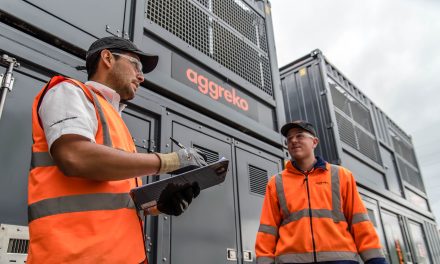By Christopher Kent, Global Vice President of Nokia’s Enterprise and Private Wireless Sales Organisation

The question ‘should I digitalise’ is no longer relevant when it comes to how chemical manufacturing companies are transforming themselves. This is an industry that has started some time ago on the path to digital transformation, with the concomitant effects of COVID-19 – supply chain constraints, labour shortages, and inflation – only fuelling the pace at which change occurred.
Those first movers, typically the largest chemical companies, have seen how digitalisation can help them meet revenue and sustainability goals while keeping employees safe and secure – the trifecta of a successful business.
Still, there is much to do. In a series of interviews conducted with chemical industry experts, we learned some of the challenges keeping the industry awake at night and how digitalisation ingredients like private wireless, an industrial edge as well as industrial devices and applications can maximise their digital transformation journey.
Let’s dig a little deeper into the industry’s unique issues.
The challenges
Chemical manufacturing is a complex production process. Labs and processes consume and generate a lot of data, and companies are also looking to gather that data in real-time in order to advance process simulations and control rising production costs.
The industry is also significant to the global production chain, with a 2019 study by Oxford Economics calculating its annual contribution to global GDP at $5.7 trillion in 2017 – about 7.1 percent of total global GDP. The products and services created by plastics and chemical companies feed the entire manufacturing sector – from automotive to consumer goods – and disruptions can affect the world’s economy.
Recruiting new talent is tough as well. Attracting and keeping digital-savvy engineers, data analysts and other skilled workers is a struggle, yet essential as long-time employees reach retirement. They also need innovation in how they capture that knowledge and expertise, so it doesn’t go out the door with a departing employee.
The opportunities
Digitalisation and Industry 4.0 technologies can help address these challenges by enabling them to gain better control of their assets, generate meaningful insights from data, and support 24/7 operations.
The industry is already implementing Internet of Things (IoT) devices. Indeed, according to an ABI Research report, 5G-connected IoT devices inside chemical manufacturing companies are expected to multiply to more than 4.8 million by the end of this decade. They’re also spending on technologies like predictive maintenance, digital twins, augmented reality and Industrial IoT.
This is where connectivity really matters.
Connected devices on their own will not realise the true benefits of Industry 4.0. And Wi-Fi networks at plants and campuses were not designed to connect everyone and everything or turn data into meaningful insights. These networks can’t ensure mission-critical processes that demand high bandwidth coverage, low latency, strong security, and 24/7 availability. In smart manufacturing, for example, Wi-Fi signals do not propagate well in many industrial environments where ceilings are high and building structures cause interference. Wi-Fi cannot support the mobile requirements of automated guided vehicles (AGVs), or the latency of the faster moving arms of robots. It has no support for the low power requirements of sensors and other IoT devices. And it cannot support the high density of sensors, devices, robots, workers and vehicles that are operating in the typical manufacturing plant.
Pervasive connectivity
What’s needed is a platform based connectivity solution that can interface with legacy environments and provide robust security, flawless 24/7 availability, and deterministic performance for mission-critical processes. Which is where private wireless networks and an industrial edge come in.
3GPP technologies such as 4.9G/LTE and 5G cellular networks are available in configurations perfectly suited to building industrial-strength private wireless networks to support Industry 4.0. They bring the best features of wireless and cable connectivity and have proven their capabilities both in large consumer mobile networks as well as in many industrial segments.
Digital transformation enables multiple use cases, from digital twins and autonomous mobile robots (AMRs) to remote maintenance and rich group communications. They can help a company expand site and plant automation, improve asset tracking and quality assurance, increase data transparency, and augment workforce safety and productivity.
To get there, organisations must collect, store, process and communicate data from all aspects of the operation. Data from IIoT sensors must be processed by edge computing systems that can use artificial intelligence (AI) and machine learning (ML) to model and analyse it. The results must then be used to make split-second decisions, reconfigure processes and achieve new efficiencies, especially around automation.
Powerful edge
However, capturing real-time, quality, proprietary data is a significant roadblock to transformation. Today, 70 percent of industrial assets, machines and field workers are not connected, and the two dominant languages used across offices and factory floors – information technology and operational technology (IT/OT) – are often incompatible with each other.
This is where the combination of private wireless with an on-premises edge can be a game-changer, guaranteeing the always-on connectivity required for fully digitalised IT and OT operations.
Much becomes possible. Applications like push-to-talk and push-to-video services for one-to-one or many communications, digital twins to monitor the network and manage devices, scene analytics based on real-time video and IoT streams, and aerial insights from connected drones. Recruitment and knowledge transfer are boosted by AI/ML capabilities, enabling real-time advanced simulations and AR/VR augmented training modules and processes. Ruggedised industrial devices revolutionise safety and efficiency, making harsh and noisy environments – so typical of manufacturing sites – more attractive as workspaces.
Producing transformative change
Like many organisations, chemical manufacturers are looking to boost productivity, sustainability, and worker safety and retention – without disrupting critical operations. Robust wireless connectivity is at the heart of this. Combine private wireless with edge solutions, applications, and industrialised devices – all secured against cybersecurity threats – and the road ahead for digital transformation will be far smoother.



